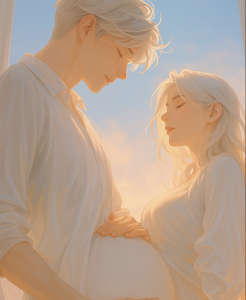A cold frost, unbefitting the season, settled on Ian Dalton’s face.
He turned toward the garden. Walking slowly, he opened the envelope and examined its contents. A single sheet of paper. Unfolded, it was half-filled with writing.
He read the letter by the light of the sunset.
To Uncle Ian,
I hope you have been well.
It has been nearly six months since our last meeting. I hope the displeasure you felt that day has been softened, even a little, by the passage of time.
I have fully recovered. Now, I intend to return to Paris to pursue the dreams I left behind. Unless the entire continent sinks and England becomes the whole world, I do not plan to return. With no way back, I will stake my life on painting. Even if I end up sleeping in a park for lack of rent, I will gladly freeze to death.
I wish you a happy family with the children to come. You and Aunt deserve to enjoy happiness.
Farewell, then.
Henry Fairfax
It was a concise farewell letter.
Henry seemed determined to follow Ian’s orders: to leave Yorkshire and never appear before the Daltons again.
Soon, Henry would leave England. The nephew, once dearly loved but now a burden, was exiting Laura and Ian’s lives for good.
“Good riddance,” Ian thought matter-of-factly, folding the letter and slipping it into his pocket.
He looked up at the sky. The reddish hue was blending with deep purple darkness.
Gazing in awe at the mysterious beauty, Ian briefly considered Henry’s decision.
“He’s finally chasing his fate.”
Henry was not suited to be a patriarch. Or rather, if he became one, he would be miserable. A life of serving duty while keeping passion confined to hobbies—that suited Ian Dalton, but not Henry. Henry would have withered away under such obligations.
He had finally returned to the path he was meant to take.
Ian slipped his hands into his trouser pockets and strolled along the path.
His thoughts drifted back to his mid-twenties, a time much like Henry’s age now.
The path Henry chose was one Ian had once dreamed of. At twenty-four, in his youthful reveries, he often imagined crossing to Paris, dedicating his life to the muse of art.
A romantic city. Eccentric, cheerful artist companions. Endless time to devote to painting. The privilege of calling admired artists like Rembrandt and Vermeer his predecessors.
Ian had told Henry he did not regret choosing the life of a landowner. That was true. But that didn’t mean his youthful dreams had lost their luster.
A fantasy abandoned never fades. The dreams of youth still lingered in his soul, vibrant as a rainbow. A fragment of youth he could occasionally gaze upon, lost in nostalgia, yet never grasp.
But even as he looked at that rainbow, he did not forget. At this moment, Ian Dalton’s life held a beauty no less radiant.
Instead of dazzling Paris, he had the lovely Whitefield. Instead of artist friends, he had family and neighbors, and he found meaning in the time spent advancing his family’s legacy.
When he wanted to paint, he could paint as he pleased. No need to struggle to surpass Rembrandt or Vermeer, no need to toil to sell even one more piece. Art was a hobby, not a profession.
“One more thing.”
Ian stopped walking. Slowly, he turned around.
A white stone mansion, like a palace of snow, filled his view. Whitefield Hall, where he was born and raised.
He looked at the dining room on the second floor, fourth from the end. Candlelight glowed brightly, suggesting it had been lit.
His wife was there now, waiting for him. To share dinner with her husband.
“Laura.”
A smile spread across Ian’s lips.
Yes. If he had gone to Paris, he never would have met Laura.
“My choice was not wrong.”
Ian walked toward the mansion. To spend an ordinary yet irreplaceable evening, dining and talking with his wife across a silver candelabra.
Since her first visit in May, Olivia Fairfax had been a frequent presence at Whitefield.
In the Daltons’ home, Olivia was always a welcome guest. Among Ian’s nephews and nieces, she was the one who caused the least trouble (in many senses), and having played a role in the Daltons’ marriage, she held a kind of revered status at Whitefield Hall.
Of course, that status was a title secretly bestowed by her uncle, and the special treatment came only from Ian. The fact that the two had conspired to make Laura Mrs. Dalton before the marriage was a closely guarded secret. Olivia and Ian feared losing face with Laura. For Olivia, whose joy in life was being doted on by her aunt, this was especially true.
When Olivia visited, she would stick to Laura’s side for half the day, showering her with all sorts of affection.
Who wouldn’t be delighted by a charming niece acting so endearingly? Laura found herself laughing more often since Olivia’s visits resumed. Though she sometimes found it odd how Olivia’s eyes sparkled excessively when looking at her growing belly, she dismissed it as excitement over the prospect of new cousins.
It was only natural that Laura didn’t know Olivia’s true intentions. After failing with her gift offensive, Olivia had become quite cautious. She was undeniably Ian’s niece. With love as her motive, she could become a master strategist, capable of deceiving even the gods.
Thus, while Olivia outwardly played the part of a fifteen-year-old niece who simply adored her aunt, inwardly she dreamed of becoming a wealthy lady, traveling Europe with her twin cousins, Oliver and Olivia, by her side. And so, June arrived, the gateway to summer.
It was the month Laura entered her ninth month of pregnancy. Hannah began earnestly preparing the birthing room and arranging for a midwife to assist with the delivery.
Laura’s belly was clearly not carrying just one child. Hannah’s keen observation that the baby was twins had proven correct.
Hannah cautiously advised that Laura would need strength for the birth. Spending all her time reading parenting books in the nursery wouldn’t do.
“You should go out to the garden sometimes, get some sun, and walk a bit. Stairs may be risky, but a body without any muscle is just as dangerous for childbirth.”
Hannah’s advice reached Ian through Laura, and Ian made her promise to let him help her up and down the stairs.
Thereafter, Laura spent her afternoons outdoors. Arm-in-arm with Olivia, who came to visit, and supporting her waist with her other hand, Laura’s waddling figure on the lush grass became a familiar sight through the windows.
Their laughter, too, was as much a part of Whitefield Hall’s daily sounds as the breeze rustling through the forest.
One mid-June day, Ian was looking down at his wife in the garden from his study window.
Laura was sitting on a garden bench with Olivia. Olivia was animatedly describing something that had happened at Dunville Park, gesturing wildly, while Laura leaned back, laughing heartily. From their movements alone, Ian could guess that George Fairfax had, once again, broken something at Dunville Park.
Ian gazed at Laura’s belly, clad in a light green summer dress. It bulged like a bundle wrapped in winter clothes.
A shadow fell over his face. A trace of worry he never showed in front of Laura.
“It’ll be fine.”
He tried to hold onto optimism. But looking at that belly, dark thoughts kept creeping in. He shook his head and turned back into the study. Nothing dispelled pessimism like work.
Ian sat at his desk. On it, about thirty business cards from law firms across England were lined up like soldiers in uniform.
Last winter, Ian’s legal representative, Mr. Thompson, had announced his retirement. He intended to step away from work and spend his remaining years in the countryside. Nearing sixty and suffering from gout, it was hardly surprising.
Mr. Thompson planned to move to Bath by autumn for recuperation, so Ian needed to find a new legal representative quickly. It was a troublesome task. Finding a lawyer both competent and principled was as difficult as finding a trustworthy estate agent.
Mr. Thompson had recommended his only son, who had taken over the family business, but Ian declined. Thompson was a self-made man, rising from a poor fisherman’s son to a respected lawyer. But precisely because of that, Ian distrusted his son. In his experience, self-made fathers often raised their sons like princes, not responsible professionals.
Thus, Ian had been tirelessly interviewing prominent lawyers of late. But none had yet met his standards.
Male lead says he’s pregnant — and it’s female lead’s child
Something seems a bit off about this world.
Wang Zhao thought as she watched a pregnant man walking towards her…

Intro
Female lead finds herself in a world where the men who possess the ability to bear children.
As she navigates this unfamiliar reality, she is caught off guard by the sudden appearance of her boyfriend, who reveals that he is pregnant.
Is this truly her boyfriend?
Why can’t she recall any details about their time together?
She begins to doubt whether the child her boyfriend is carrying is even hers.
Is there a hidden reason behind her amnesia, or could it be a side effect of her sudden arrival in this strange new world?
Just when it seems the protagonist’s life couldn’t become any more entangled, her ex-boyfriend makes an unexpected appearance, raising questions about the protagonist’s past.
__________
Please help me, I want to bring you the best possible things.
If you find any chapter or novel with poor translation and editing quality, let me know by commenting directly under that novel or chapter. I will retranslate it as soon as possible.
[Touch the gear icon in the bottom right corner of the screen to move to the next chapter if you want.]




